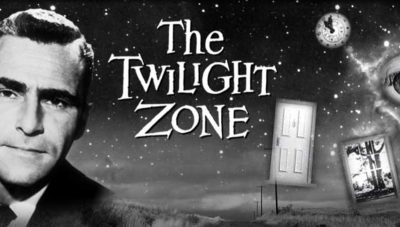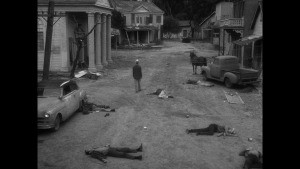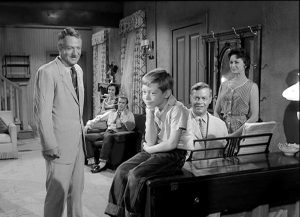
The Twilight Zone and the coronavirus are not often linked together. However, sometimes it is amazing to realize how well Rod Sterling (and Gene Roddenberry) anticipated our present. In this blog, I will present three episodes of the Twilight Zone that easily could have been created now with some adjustments. One should keep in mind that back in the 60s, there was a greater fear of nuclear war destroying us than a virus. The comments and descriptions on the websites about the episode tell the tale we are now living. They come from imdb.com and Wikipedia mixed with some comments of my own.
The Old Man in the Cave
Twilight Zone Season 5 Episode 7 Original air date November 8, 1963

Opening narration
What you’re looking at is a legacy that man left to himself. A decade previous he pushed his buttons and a nightmarish moment later woke up to find that he had set the clock back a thousand years. His engines, his medicines, his science were buried in a mass tomb, covered over by the biggest gravedigger of them all—a bomb. And this is the earth 10 years later, a fragment of what was once a home, a remnant of what was once a race. The year is 1974 and this is The Twilight Zone.
The prediction of a nuclear war in 1964 went unfilled. In a time after the Cuban Missile Crisis but just before the assassination of an American president, the idea did not seem farfetched.
In a sparsely populated town in 1974, ten years after a nuclear war has devastated the US, the townspeople have discovered a supply of canned food. However, they are waiting for Mr. Goldsmith [Fauci], the town’s leader, to return with a message from the mysterious and unseen “old man in the cave” [science] who will tell them whether the food is contaminated with radiation. Some of the townsfolk want to take their chances and end social distancing and eat the food together, but they refrain from doing so after seeing the disastrous death totals when they failed to take the old man’s advice about which farming areas were contaminated. When Mr. Goldsmith returns, he informs them that the old man has declared the food is contaminated and that it should be destroyed.
Shortly thereafter, a group of soldiers led by Major French [aka Fox] enter the town and clash with Goldsmith as they try to establish their authority. The soldiers may or may not be representatives of the US government as its propaganda outlet…A clash of wills ensues and, frustrated by Goldsmith’s quiet and steadfast refusal to bend, French tries to dispel the townspeople’s strange beliefs about the seemingly infallible old man in the cave and take control of the area. French tempts the townspeople with some of snake-oil elixir his gut tells him he likes. Goldsmith claimed it was unproven. Many throw caution to the wind and partakes of. the food and drink. After being bullied and threatened with his life, Goldsmith finally opens the cave door and it is ultimately revealed that in reality, the townsfolk have been using information from a computer [algorithms] the whole time. French rallies the townspeople into a frothing frenzy into destroying the machine, after which French leads the people into celebrating their new found freedom from this “tyranny” of social distancing. However, as Mr. Goldsmith had insisted, the “old man” was correct; without an authority figure to tell them which foods are safe, the entire human population of the town (including French and the soldiers) die—except for the lone survivor, Mr. Goldsmith, who somberly walks out of the now dead town.
Closing narration
Mr. Goldsmith, survivor. An eyewitness to man’s imperfection. An observer of the very human trait of greed. And a chronicler of the last chapter—the one reading “suicide”. Not a prediction of what is to be, just a projection of what could be. This has been The Twilight Zone.
My prediction is that despite all the efforts of Fox and its friends, most governors will maintain the social distancing restrictions until June 1 based on the currently available information from reputable sources. They will be guided by the advice of Fauci and not the wartime President.
Hocus-Pocus and Frisby: Where Are the Martians When You Need Them?
Twilight Zone Season 3 Episode 30 [30!!!! episodes in a season!!! Is that possible?] Original air date April 13, 1962

Opening narration
The reluctant gentleman with the sizable mouth is Mr. Frisby. He has all the drive of a broken camshaft and the aggressive vinegar of a corpse. As you’ve no doubt gathered, his big stock in trade is the tall tale. Now, what he doesn’t know is that the visitors out front are a very special breed, destined to change his life beyond anything even his fertile imagination could manufacture. The place is Pitchville Flats, the time is the present. But Mr. Frisby’s on the first leg of a rather fanciful journey into the place we call the Twilight Zone.
Plot
Somerset Frisby has a general store/gas station in a small town, and the townsfolk know him well for the tall tales he spins of his experiences, from his heroism in war despite his bone spurs to his drug cures because of his super-genius uncle to his unsolicited advice via tweets to presidents and captains of industry, all of which he fabricates. His friends gather in the store to hear him spin his stories, which they find very entertaining, and he never tells the truth except by chance. But he means no harm and is not a horrid, nasty, cutie pie.
One evening, when he is alone at closing time, creatures from another planet lure him into their clutches while disguised as humans, then abduct him to their spaceship. They want to add Frisby to their collection of specimens from other planets. The aliens accept his tales at face value. They have heard Frisby claim eight doctoral degrees, being the greatest baseball player in New York City and a great athlete, and a very stable genius, the smartest person in the room. Naturally, they want him as the outstanding example of the human race. Ignoring his plea that he is late for supper, the aliens insist that Frisby accompany them to their planet.
Frisby pleads that he is simply a shameless liar, but the aliens have no concept of lying. He manages to escape. When he tries to tell his friends what happened, they enjoy a laugh at what they of course take to be another of Frisby’s tall tales.
Closing narration
Mr. Somerset Frisby, who might have profited by reading an Aesop fable about a boy who cried wolf. Tonight’s tall tale from the timberlands of the Twilight Zone.
If only the Martians would come so our Lord and Savior, the Chosen One, Blessed Be his Name, would ascend to the heavens and save us from having to listen to any more tall tales instead of being regaled with them on a daily basis.
It’s a Good Life
Twilight Zone Season 3 Episode 8 Originally broadcast Nov. 3, 1961

On an isolated family farm, a young boy with vast mental powers, but lacking emotional development, holds his terrified family in thrall to his every juvenile wish.
This is a portrayal of a nightmare. It’s one of those things where you hope you’ll wake up. It’s about an entire community that has been taken over by a child brat who is totally self-centered and sociopathic. He probably doesn’t realize the error of his ways. Any effort to educate him would result in being “sent to the cornfield.” This is a state of limbo. When your adversary has no conscience, he cannot be approached in a rational way. This story is about fear. Not only are the people under constant threat, the world the boy is creating is one that is becoming bleak and vacuous.
As you read the opening narration please keep in mind that the story is about an actual six-year old in mind and body and that he has actual supernatural powers. These two considerations mean the story is not an exact parallel to the real world but the fundamentals ring true as even in the real world an immature child can have great powers at his command.
Opening narration
Tonight’s story on The Twilight Zone is somewhat unique and calls for a different kind of introduction. This, as you may recognize, is a map of the United States, and there’s a little town there called Peaksville. On a given morning not too long ago, the rest of the world disappeared and Peaksville was left all alone. They were, on the other hand, sure of one thing: the cause. A monster had arrived in the village. Now I’d like to introduce you to some of the people in Peaksville, Ohio. And you’ll note that the people in Peaksville, Ohio have to smile. They have to think happy thoughts and say happy things because, once displeased, the monster can wish them into a cornfield or change them into a grotesque, walking horror. Oh yes, I did forget something, didn’t I? I forgot to introduce you to the monster. This is the monster. His name is Anthony Fremont. He’s six years old, with a cute little-boy face and blue, guileless eyes. But when those eyes look at you, you’d better start thinking happy thoughts, because the mind behind them is absolutely in charge. This is the Twilight Zone.
Plot summary
At the beginning of the show, the child is playing with his animals. He loves playing with his animals. They are right out of central casting. And since he likes science fiction he can makes his animals into any form he wants. They can even speak out of both sides of their mouths if he wants them to just as he does. But eventually the child tires of his toys who sometimes have minds of their own and they are disposed of, banished to the cornfields where this field of dreams is a nightmare.
The people live in fear of him, of the uncertainty, of never knowing what the child will say next. They constantly tell him how everything he does is “good,” the best ever, the greatest ever whereas everything before him was the worst ever.
One night each week, the child gives the townsfolk one hour of television, which he creates and projects onto the family TV set. The adults gather around in his living room, squirming uncomfortably as child shows them a vision of Fox and Friends with screaming dinosaur talking heads engaged in a gory battle. Unable to voice their real feelings, they tell the child that it was far better than what used to be on TV. Everything now is the greatest ever.
His aunt Amy whose brain had been “fixed,” says “I kind of liked it a little better when we had cities outside and could get real television.”
The child’s mother replies, “The child’s television is much better than anything we used to get.”
The child’s father adds: “Why it’s fine. Why Fox television is the best thing we have ever seen.”
After the program is over, the adults celebrate Dan Hollis’ birthday. He gets a bottle of brandy. Getting drunk from the brandy, he starts complaining about the miserable state of the town. The child at first ignores him after telling him to be quiet. Dan eventually snaps with repressed rage surfacing and confronts the child.
You monster you, you dirty little monster…. maybe some man in this room; some Republican with guts, somebody who is so sick to death of living in this kind of a place and willing to take a chance will sneak up behind you and lay something heavy across your skull and end this once and for all.
Somebody sneak up behind him. Somebody end this now….
Will somebody take a lamp or a bottle or something and end this.
The printed word cannot capture the intensity of the anguish of this emotionally wrought person who can no longer endure the reign of the child, who only speaks in Happy Talk. Aunt Amy tentatively reaches for a fireplace poker but no one has the courage to act. The child banishes him to the cornfield. The adults are horrified at what he had done but no one does anything,
The child then causes the stock market to drop and the coronavirus to spread needlessly killing far more than it would have if he could only read a report or manage people who were professional. The father then smiles and tells the child in a terrified voice, “…But it’s good you’re making the coronavirus spread unchecked for weeks. A real good thing. And tomorrow… tomorrow’s gonna be a… real good day!”
Is there anything more dangerous… than a spoiled, selfish, stuck-up little brat who always gets his way?
Closing narration
No comment here, no comment at all. We only wanted to introduce you to one of our very special citizens, little Anthony Fremont, age 6, who lives in a village called Peaksville, in a place that used to be Ohio. And, if by some strange chance, you should run across him, you had best think only good thoughts, talk happy talk, and profess loyalty as if you were Mike Pence himself and not that woman from Michigan. Anything less than that is handled at your own risk and you will not get the medical equipment and supplies you need because the Federal Government is just a backup. If you have to deal with Anthony, you can be sure of one thing: you have entered The Twilight Zone.
How did Rod know?






“There is a longstanding aversion to science in the United States.“
Yeah. That’s right. That explains the dearth of scientific achievements in the United States since the mid 19th Century.
Maybe in your next screed you can talk about how Darwinism fueled the Eugenics movement. The point is, even the perfectly valid and sound basic tenets of Darwinism can be distorted and perverted by people who have all of the best academic credentials you would ever want to smell. People you would call intellectuals. Kindred spirits!
Dogma, whether it’s religious, scientific or political, is still dogma.
Most religious people are not anti-science. They know the Bible was written by ancient people and they are perfectly capable of thinking in metaphors. Bishop Ussher’s cosmology has no traction. If it does, it’s with a minority of religious zealots who are laughed at by their mainstream co-religionists. Nowadays, religion is more about “fellowship” and “community service” than scripture. Think food pantries and homeless shelters.Some people find comfort in tradition and find secular alternatives wanting. Some of those people… now hold on to your hat!… are even scientists!
Do some research on the anti-slavery movements starting in the early nineteenth century and learn something about social reformers who advocated humane treatment for the mentally ill, orphans and poor. Do you think Civil war nurses were agnostics? Radical public sanitation initiatives certainly didn’t come from the secular sphere. You just might discover that the reformers were … gasp!… religious people drawing on their religious beliefs. It wasn’t until the days of TR that government started to concern itself with public welfare.
I’m not a religious person by a long shot. I’m more interested in history. Leave the stunted caricatures of people you don’t like – and the lame rhetoric illustrated by tinseltown melodramas – to the liberal arts undergrads who are more likely to look up to you as an authority figure.
Hi Roger,
Good to hear from you. It has been a while. My reply is in CAPS.
“There is a longstanding aversion to science in the United States.“
I WAS REFERRING TO A SEGMENT OF THE POPULATION AND NOT TO EVERYONE. SO I SHOULD HAVE BEEN MORE CLEAR.
Yeah. That’s right. That explains the dearth of scientific achievements in the United States since the mid 19th Century.
EXACTLY. AS I SIT HERE TYPING ON MY COMPUTER AND SENDING BLOGS VIA THE INTERNET I AM WELL AWARE OF THE DEARTH OF SCIENTIFIC ACHIEVEMENTS IN THE UNITED STATES SINCE THE MID 19TH CENTURY.
Maybe in your next screed you can talk about how Darwinism fueled the Eugenics movement. The point is, even the perfectly valid and sound basic tenets of Darwinism can be distorted and perverted by people who have all of the best academic credentials you would ever want to smell. People you would call intellectuals. Kindred spirits!
I AM NOT FAMILIAR ENOUGH THE EUGENICS MOVEMENT TO WRITE A BLOG ABOUT IT YET ALONE A SCREED PARTICULARLY AS IT RELATES TO NEW YORK HISTORY.
FOR THE RECORD, I DON’T SMELL CREDENTIALS AND HAVING ACADEMIC CREDENTIALS DOES NOT MAKE ONE AN INTELLECTUAL.
Dogma, whether it’s religious, scientific or political, is still dogma.
AGREED.
Most religious people are not anti-science. They know the Bible was written by ancient people and they are perfectly capable of thinking in metaphors. Bishop Ussher’s cosmology has no traction. If it does, it’s with a minority of religious zealots who are laughed at by their mainstream co-religionists. Nowadays, religion is more about “fellowship” and “community service” than scripture. Think food pantries and homeless shelters. Some people find comfort in tradition and find secular alternatives wanting. Some of those people… now hold on to your hat!… are even scientists!
HAVE YOU EVER BEEN TO THE CREATION MUSEUM? OBVIOUSLY THERE IS AN AUDIENCE FOR THE 4004 BC CHRONOLOGY.
Do some research on the anti-slavery movements starting in the early nineteenth century and learn something about social reformers who advocated humane treatment for the mentally ill, orphans and poor. Do you think Civil war nurses were agnostics? Radical public sanitation initiatives certainly didn’t come from the secular sphere. You just might discover that the reformers were … gasp!… religious people drawing on their religious beliefs. It wasn’t until the days of TR that government started to concern itself with public welfare.
I AM NOT SURE HOW YOU MADE THE LEAP FROM THOSE WHO ACCEPT THE 4004 BC CHRONOLOGY TO ALL RELIGIOUS PEOPLE. I RECOGNIZE YOUR DESIRE TO MOCK ME, BUT HERE I THINK YOU’RE READING WAY TO MUCH INTO THE BLOG. THIS PARAGRAPH UNDERMINES YOUR ARGUMENT.
I’m not a religious person by a long shot. I’m more interested in history. Leave the stunted caricatures of people you don’t like – and the lame rhetoric illustrated by tinseltown melodramas – to the liberal arts undergrads who are more likely to look up to you as an authority figure.
HERE AGAIN YOU ARE LETTING YOU DESIRE TO MOCK ME UNDERMINE YOUR ARGUMENT. THE ONLY “STUNTED CARICATURES” I MAY HAVE MENTIONED WERE FROM A MOVIE THAT REFLECTS THE VERY CULTURE WAR I SOMETIMES WRITE ABOUT. SINCE I DON’T TEACH, YOU DON’T HAVE TO WORRY ABOUT LIBERAL ARTS UNDERGRADS LOOKING UP TO ME AS AN AUTHORITY FIGURE. YOU CAN REST EASY ON THAT POINT.
Be safe,
Peter
I was enjoying the article until I neared the end. It is sad to read of such bias from “historians.” Historians who can discuss such matters without value judgments appear to be a dying breed in America, too…….
After historians gather information and analyze it, it is typical to reach a conclusion of some kind. There has to be some explanation for why the United States is an outlier on some of these scientific-related issues and my conclusion is the acceptance of 4004 BC for the creation is part of it.
Thanks for writing,
Peter
Read you last column
Attached is a letter by a Ridge Road traveler written in 1825
I am sure you will find it an interesting read.
Thanks Bill. It seems like they were aware of the geological changes generated by the retreating glaciers without having an explanation. For me this is all part of the Erie Canal history that should be included in the bicentennial celebration.
Thank you!!
and Darrow dropped dead a few weeks after he lost here, yes ?
It was William Jennings Bryan who died shortly after the trial and not at the conclusion as in Inherit the Wind.